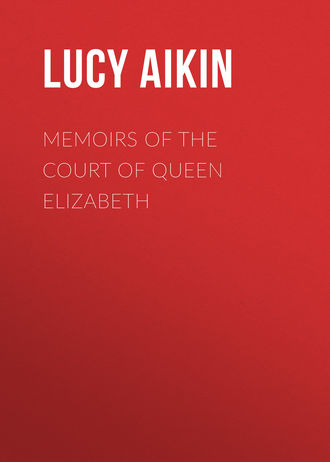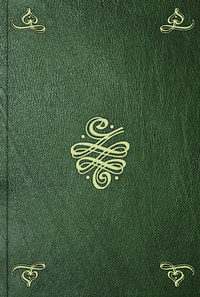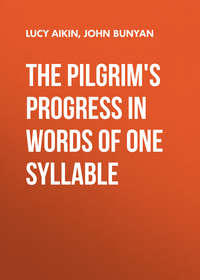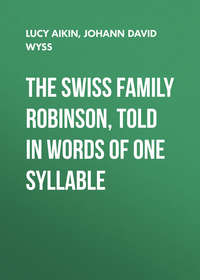 полная версия
полная версияMemoirs of the Court of Queen Elizabeth
These circumstances seem to have produced a cordiality of feeling and frequency of intercourse between the sisters which had never before existed. In February 1557 the princess arrived with a great retinue at Somerset Place, and went thence to wait upon the queen at Whitehall; and when the spring was somewhat further advanced, her majesty honored her by returning the visit at Hatfield. The royal guest was, of course, to be entertained with every species of courtly and elegant delight; and accordingly, on the morning after her arrival, she and the princess, after attending mass, went to witness a grand exhibition of bear-bating, "with which their highnesses were right well content." In the evening the chamber was adorned with a sumptuous suit of tapestry, called, but from what circumstance does not appear, "the hangings of Antioch." After supper a play was represented by the choristers of St. Paul's, then the most applauded actors in London; and after it was over, one of the children accompanied with his voice the performance of the princess on the virginals.
Sir Thomas Pope could now without offence gratify his lady with another show, devised by him in that spirit of romantic magnificence equally agreeable to the taste of the age and the temper of Elizabeth herself. She was invited to repair to Enfield Chase to take the amusement of hunting the hart. Twelve ladies in white satin attended her on their "ambling palfreys," and twenty yeomen clad in green. At the entrance of the forest she was met by fifty archers in scarlet boots and yellow caps, armed with gilded bows, one of whom presented to her a silver-headed arrow winged with peacock's feathers. The splendid show concluded, according to the established laws of the chase, by the offering of the knife to the princess, as first lady on the field; and her taking 'say of the buck with her own fair and royal hand.
During the summer of the same year the queen was pleased to invite her sister to an entertainment at Richmond, of which we have received some rather interesting particulars. The princess was brought from Somerset Place in the queen's barge, which was richly hung with garlands of artificial flowers and covered with a canopy of green sarcenet, wrought with branches of eglantine in embroidery and powdered with blossoms of gold. In the barge she was accompanied by sir Thomas Pope and four ladies of her chamber. Six boats attended filled with her retinue, habited in russet damask and blue embroidered satin, tasseled and spangled with silver; their bonnets cloth of silver with green feathers. The queen received her in a sumptuous pavilion in the labyrinth of the gardens. This pavilion, which was of cloth of gold and purple velvet, was made in the form of a castle, probably in allusion to the kingdom of Castile; its sides were divided in compartments, which bore alternately the fleur de lis in silver, and the pomegranate, the bearing of Granada, in gold. A sumptuous banquet was here served up to the royal ladies, in which there was introduced a pomegranate-tree in confectionary work, bearing the arms of Spain:—so offensively glaring was the preference given by Mary to the country of her husband and of her maternal ancestry over that of which she was a native and in her own right queen! There was no masking or dancing, but a great number of minstrels performed. The princess returned to Somerset Place the same evening, and the next day to Hatfield.
The addresses of a new suitor soon after furnished Elizabeth with an occasion of gratifying the queen by fresh demonstrations of respect and duty. The king of Sweden was earnestly desirous of obtaining for Eric his eldest son the hand of a lady whose reversionary prospects, added to her merit and accomplishments, rendered her without dispute the first match in Europe. He had denied his son's request to be permitted to visit her in person, fearing that those violences of temper and eccentricities of conduct of which this ill-fated prince had already given strong indications, might injure his cause in the judgement of so discerning a princess. The business was therefore to be transacted through the Swedish ambassador; but he was directed by his sovereign to make his application by a message to Elizabeth herself, in which the queen and council were not for the present to participate. The princess took hold of this circumstance as a convenient pretext for rejecting a proposal which she felt no disposition to encourage; and she declared that she could never listen to any overtures of this nature which had not first received the sanction of her majesty. The ambassador pleaded in answer, that as a gentleman his master had judged it becoming that his first application should be made to herself; but that should he be so happy as to obtain her concurrence, he would then, as a king, make his demand in form to the queen her sister. The princess replied, that if it were to depend on herself, a single life would ever be her choice; and she finally dismissed the suit with a negative.
On receiving some hint of this transaction, Mary sent for sir Thomas Pope, and having learned from him all the particulars, she directed him to express to her sister her high approbation of her proper and dutiful conduct on this occasion; and also to make himself acquainted with her sentiments on the subject of matrimony in general. He soon after transmitted to her majesty all the information she could desire, in the following letter:
"First after I had declared to her grace how well the queen's majesty liked of her prudent and honorable answer made to the same messenger; I then opened unto her grace the effects of the said messenger's credence; which after her grace had heard, I said, the queen's highness had sent me to her grace, not only to declare the same, but also to understand how her grace liked the said motion. Whereunto, after a little pause taken, her grace answered in form following: 'Master Pope, I require you, after my most humble commendations to the queen's majesty, to render unto the same like thanks that it pleased her highness, of her goodness, to conceive so well of my answer made to the same messenger; and herewithal, of her princely consideration, with such speed to command you by your letters to signify the same unto me: who before remained wonderfully perplexed, fearing that her majesty might mistake the same: for which her goodness, I acknowledge myself bound to honor, serve, love, and obey her highness during my life. Requiring you also to say unto her majesty, that in the king my brother's time there was offered me a very honorable marriage, or two; and ambassadors sent to treat with me touching the same; whereupon I made my humble suit unto his highness, as some of honor yet living can be testimonies, that it would like the same to give me leave, with his grace's favor, to remain in that estate I was, which of all others best liked me, or pleased me. And, in good faith, I pray you say unto her highness, I am even at this present of the same mind, and so intend to continue, with her majesty's favor: and assuring her highness I so well like this estate, as I persuade myself there is not any kind of life comparable unto it. And as concerning my liking the said motion made by the said messenger, I beseech you say unto her majesty, that to my remembrance I never heard of his master before this time; and that I so well like both the message and the messenger, as I shall most humbly pray God upon my knees, that from henceforth I never hear of the one nor the other: assure you that if he should eftsoons repair unto me, I would forbear to speak to him. And were there nothing else to move me to mislike the motion, other than that his master would attempt the same without making the queen's majesty privy thereunto, it were cause sufficient.'
"And when her grace had thus ended, I was so bold as of myself to say unto her grace, her pardon first required, that I thought few or none would believe but that her grace could be right well contented to marry; so that there were some honorable marriage offered her by the queen's highness, or by her majesty's assent. Whereunto her grace answered, 'What I shall do hereafter I know not; but I assure you, upon my truth and fidelity, and as God be merciful unto me, I am not at this time otherwise minded than I have declared unto you; no, though I were offered the greatest prince in all Europe.' And yet percase, the queen's majesty may conceive this rather to proceed of a maidenly shamefacedness, than upon any such certain determination30."
This letter appears to have been the last transaction which occurred between Mary and Elizabeth: from it, and from the whole of the notices relative to the situation of the latter thrown together in the preceding pages, it may be collected, that during the three last years of her sister's reign,—the period, namely, of her residence at Hatfield,—she had few privations, and no personal hardships to endure: but for individuals whom she esteemed, for principles to which her conscience secretly inclined, for her country which she truly loved, her apprehensions must have been continually excited, and too often justified by events the most cruel and disastrous.
The reestablishment, by solemn acts of the legislature, of the Romish ritual and the papal authority, though attended with the entire prohibition of all protestant worship, was not sufficient for the bigotry of Mary. Aware that the new doctrines still found harbour in the bosoms of her subjects, she sought to drag them by her violence from this last asylum; for to her, as to all tyrants, it appeared both desirable and possible to subject the liberty of thinking to the regulation and control of human laws.
By virtue of her authority as head of the English church,—a title which the murmurs of her parliament had compelled her against her conscience to resume after laying it aside for some time,—she issued an ecclesiastical commission, which wanted nothing of the Spanish inquisition but the name. The commissioners were empowered to call before them the leading men in every parish of the kingdom, and to compel them to bind themselves by oath to give information against such of their neighbours as, by abstaining from attendance at church or other symptoms of disaffection to the present order of things, afforded room to doubt the soundness of their belief. Articles of faith were then offered to the suspected persons for their signature, and on their simple refusal they were handed over to the civil power, and fire and faggot awaited them. By this barbarous species of punishment, about two hundred and eighty persons are stated to have perished during the reign of Mary; but, to the disgrace of the learned, the rich, and the noble, these martyrs, with the exception of a few distinguished ecclesiastics, were almost all from the middling or lower, some from the very lowest classes of society.
Amongst these glorious sufferers, therefore, the princess could have few personal friends to regret; but in the much larger number of the disgraced, the suspected, the imprisoned, the fugitive, she saw the greater part of the public characters, whether statesmen or divines, on whose support and attachment she had learned to place reliance.
The extraordinary cruelties exercised upon sir John Cheke, who whilst he held the post of preceptor to her brother had also assisted in her own education, must have been viewed by Elizabeth with strong emotion of indignation and grief.
It has been already mentioned, that after his release from imprisonment incurred in the cause of lady Jane Grey,—a release, by the way, which was purchased by the sacrifice of his landed property and all his appointments,—this learned and estimable person obtained permission to travel for a limited period. This was regarded as a special favor; for it was one of Mary's earliest acts of tyranny to prohibit the escape of her destined victims, and it was only by joining themselves to the foreign congregations of the reformed, who had license to depart the kingdom, or by eluding with much hazard the vigilance of the officers by whom the seaports were watched, that any of her protestant subjects had been enabled to secure liberty of conscience in a voluntary exile. It is a little remarkable that Rome should have been Cheke's first city of pilgrimage; but classical associations in this instance overcame the force of protestant antipathies. He took the opportunity however of visiting Basil in his way, where an English congregation was established, and where he had the pleasure of introducing himself to several learned characters, once perhaps the chosen associates of Erasmus.
In the beginning of 1556 he had reached Strasburgh, for it was thence that he addressed a letter to his dear friend and brother-in-law sir William Cecil, who appears to have made some compliances with the times which alarmed and grieved him. It is in a strain of the most affectionate earnestness that he entreats him to hold fast his faith, and "to take heed how he did in the least warp or strain his conscience by any compliance for his worldly security." But such exhortations, however salutary in themselves, did not come with the best grace from those who had found in flight a refuge from the terrors of that persecution which was raging in all its fierceness before the eyes of such of their unfortunate brethren as had found themselves necessitated to abide the fiery trial. A remark by no means foreign to the case before us! Sir John Cheke's leave of absence seems now to have expired; and it was probably with the design of making interest for its renewal that he privately repaired, soon after the date of his letter, to Brussels, on a visit to his two learned friends, lord Paget and sir John Mason, then residing in that city as Mary's ambassadors. These men were recent converts, or more likely conformists, to the court religion; and Paget's furious councils against Elizabeth have been already mentioned. It is to be hoped that they did not add to the guilt of self-interested compliances in matters of faith the blacker crime of a barbarous act of perfidy against a former associate and brother-protestant who had scarcely ceased to be their guest;—but certain it is, that on some secret intimation of his having entered his territories, king Philip issued special orders for the seizure of Cheke. On his return, between Brussels and Antwerp, the unhappy man, with sir Peter Carew his companion, was apprehended by a provost-marshal, bound hand and foot, thrown into a cart, and so conveyed on board a vessel sailing for England. He is said to have been brought to the Tower muffled, according to an odious practice of Spanish despotism introduced into the country during the reign of Mary. Under the terror of such a surprise the awful alternative "Comply or burn" was laid before him. Human frailty under these trying circumstances prevailed; and in an evil hour this champion of light and learning was tempted to subscribe his false assent to the doctrine of the real presence and the whole list of Romish articles. This was but the beginning of humiliations: he was now required to pronounce two ample recantations, one before the queen in person, the other before cardinal Pole, who also imposed upon him various acts of penance. Even this did not immediately procure his liberation from prison; and while he was obliged in public to applaud the mercy of his enemies in terms of the most abject submission, he bewailed in private, with abundance of bitter tears, their cruelty, and still more his own criminal compliance. The savage zealots knew not how to set bounds to their triumph over a man whom learning and acknowledged talents and honorable employments had rendered so considerable.
Even when at length he was set free, and flattered himself that he had drained to the dregs his cup of bitterness, he discovered that the masterpiece of barbarity, the refinement of insult, was yet in store. He was required, as evidence of the sincerity of his conversion and a token of his complete restoration to royal favor, to take his seat on the bench by the side of the savage Bonner, and assist at the condemnation of his brother-protestants. The unhappy man did not refuse,—so thoroughly was his spirit subdued within him,—but it broke his heart; and retiring at last to the house of an old and learned friend, whose door was opened to him in Christian charity, he there ended within a few months, his miserable life, a prey to shame, remorse and melancholy. A sadder tale the annals of persecution do not furnish, or one more humbling to the pride and confidence of human virtue. Many have failed under lighter trials; few have expiated a failure by sufferings so severe. How often must this victim of a wounded spirit have dwelt with envy, amid his slower torments, on the brief agonies and lasting crown of a courageous martyrdom!
It is happily not possible for a kingdom to flourish under the crushing weight of such a tyranny as that of Mary. The retreat of the foreign protestants had robbed the country of hundreds of industrious and skilful artificers; the arbitrary exactions of the queen impoverished and discouraged the trading classes, against whom they principally operated; tumults and insurrections were frequent, and afforded a pretext for the introduction of Spanish troops; the treasury was exhausted in efforts for maintaining the power of the sovereign, restoring the church to opulence and splendor, and re-edifying the fallen monasteries. To add to these evils, a foreign marriage rendered both the queen and country subservient to the interested or ambitious projects of the Spanish sovereign. For his sake a needless war was declared against France, which, after draining entirely an already failing treasury, ended in the loss of Calais, the last remaining trophy of the victories by which the Edwards and the Henrys had humbled in the dust the pride and power of France.
This last stroke completed the dejection of the nation; and Mary herself, who was by no means destitute of sensibility where the honor of her crown was concerned, sunk into an incurable melancholy. "When I die," said she to her attendants who sought to discover the cause of her despondency, "Calais will be found at my heart."
The unfeeling desertion of her husband, the consciousness of having incurred the hatred of her subjects, the unprosperous state of her affairs, and the well founded apprehension that her successor would once more overthrow the whole edifice of papal power which she had labored with such indefatigable ardor to restore, may each be supposed to have infused its own drop of bitterness into the soul of this unhappy princess. The long and severe mortifications of her youth, while they soured her temper, had also undermined her constitution, and contributed to bring upon her a premature old age; dropsical symptoms began to appear, and after a lingering illness of nearly half a year she sunk into the grave on the 17th day of November 1558, in the forty-fourth year of her age.
CHAPTER IX
1558 AND 1559General joy on the accession of Elizabeth.—Views of the nobility—of the middling and lower classes.—Flattery with which she is addressed.—Descriptions of her person.—Her first privy-council.—Parry and Cecil brought into office.—Notices of each.—Death of cardinal Pole.—The queen enters London—passes to the Tower.—Lord Robert Dudley her master of the horse.—Notices respecting him.—The queen's treatment of her relations.—The Howard family.—Sir Richard Sackville.—Henry Cary.—The last, created lord Hunsdon.—Preparations in London against the queen's coronation.—Splendid costume of the age.—She passes by water from Westminster to the Tower.—The procession described.—Her passage through the city.—Pageants exhibited.—The bishops refuse to crown her.—Bishop of Carlisle prevailed on.—Religious sentiments of the queen.—Prohibition of preaching—of theatrical exhibitions.
Never perhaps was the accession of any prince the subject of such keen and lively interest to a whole people as that of Elizabeth.
Both in the religious establishments and political relations of the country, the most important changes were anticipated; changes in which the humblest individual found himself concerned, and to which a vast majority of the nation looked forward with hope and joy.
With the courtiers and great nobles, whose mutability of faith had so happily corresponded with every ecclesiastical vicissitude of the last three reigns, political and personal considerations may well be supposed to have held the first place; and though the old religion might still be endeared to them by many cherished associations and by early prejudice, there were few among them who did not regard the liberation of the country from Spanish influence as ample compensation for the probable restoration of the religious establishment of Henry or of Edward. Besides, there was scarcely an individual belonging to these classes who had not in some manner partaken of the plunder of the church, and whom the avowed principles of Mary had not disquieted with apprehensions that some plan of compulsory restitution would sooner or later be attempted by an union of royal and papal authority.
With the middling and lower classes religious views and feelings were predominant The doctrines of the new and better system of faith and worship had now become more precious and important than ever in the eyes of its adherents from the hardships which many of them had encountered for its sake, and from the interest which each disciple vindicated to himself in the glory and merit of the holy martyrs whose triumphant exit they had witnessed. With all the fervor of pious gratitude they offered up their thanksgivings for the signal deliverance by which their prayers had been answered. The bloody tyranny of Mary was at an end; and though the known conformity of Elizabeth to Romish rites might apparently give room for doubts and suspicions, it should seem that neither catholics nor protestants were willing to believe that the daughter of Anne Boleyn could in her heart be a papist. Under this impression the citizens of London, who spoke the sense of their own class throughout the kingdom, welcomed the new queen as a protectress sent by Heaven itself: but even in the first transports of their joy, and amid the pompous pageantries by which their loyal congratulations were expressed, they took care to intimate, in a manner not to be misunderstood, their hopes and expectations on the great concern now nearest to their hearts.
Prudence confined within their own bosoms the regrets and murmurs of the popish clergy; submission and a simulated loyalty were at present obviously their only policy: thus not a whisper breathed abroad but of joy and gratulation and happy presage of the days to come.
The sex, the youth, the accomplishments, the graces, the past misfortunes of the princess, all served to heighten the interest with which she was beheld: the age of chivalry had not yet expired; and in spite of the late unfortunate experience of a female reign, the romantic image of a maiden queen dazzled all eyes, subdued all hearts, inflamed the imaginations of the brave and courtly youth with visions of love and glory, exalted into a passionate homage the principle of loyalty, and urged adulation to the very brink of idolatry.
The fulsome compliments on her beauty which Elizabeth, almost to the latest period of her life, not only permitted but required and delighted in, have been adverted to by all the writers who have made her reign and character their theme: and those of the number whom admiration and pity of the fair queen of Scots have rendered hostile to her memory, have taken a malicious pleasure in exaggerating the extravagance of this weakness, by denying her, even in her freshest years, all pretensions to those personal charms by which her rival was so eminently, distinguished. Others however have been more favorable, and probably more just, to her on this point; and it would be an injury to her memory to withhold from the reader the following portraitures which authorize us to form a pleasing as well as majestic image of this illustrious female at the period of her accession and at the age of five-and-twenty.
"She was a lady of great beauty, of decent stature, and of an excellent shape. In her youth she was adorned with a more than usual maiden modesty; her skin was of pure white, and her hair of a yellow colour; her eyes were beautiful and lively. In short, her whole body was well made, and her face was adorned with a wonderful and sweet beauty and majesty. This beauty lasted till her middle age, though it declined31." &c.





